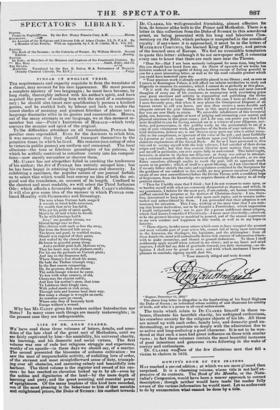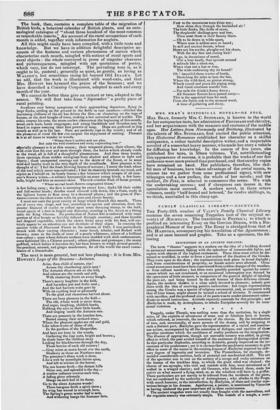HOWITT'S BOOK OF THE SEASONS
HAS reached a second edition ; at which we are more pleased than surprised. It is a charming volume, whose title is not half ex- pressive of its contents. The Book of the Months, or the Natu- ralist's Companion, would have been a nearer approach to correct description ; though neither would have made the reader fully aware of the various ihformation he would meet. Let us endeavour to do by enumeration what cannot be done by a title.
• The book, then, contains a complete table of the migration of' British birds, a botanical calendar of British plants, and an ento- mological catalogue of "about three hundred of the most common or remarkable insects.: An account of the rural occupations of each month is added, together with information for anglers.
All this might easily have been compiled, with a little taste and knowledge. But we have in addition delightful descriptive ac- counts of the features and various phenomena of nature which characterize each month, mingled with notices of rural sports and rural objects : the whole conveyed in prose of singular clearness and picturesqueness, mingled with apt quotations of poetry, which vary, but do not interrupt. The pervading tone is, as it ought to be, pastoral; generally as quiet, as gentle, as loving as WALTON'S, but sometimes rising far beyond Old Iz &ales. Let us add, that the work is illustrated with wood-cuts, and that Mrs. How err has hymned the praise of the Seasons ; and we have described a Country Companion, adapted to each and every month of the year.
We cannot do better than give an extract or two, adapted to the season. We will first take from "September" a pretty piece of rural painting.
Swallows now betray symptoms of their approaching departure, flying in large flocks, settling on the ground in the fields in vast numbers—whither the increasing chillness of the air has driven the flies—or clustering on the tops of Louses, or the dead boughs of trees, making a low universal sort of warble. The robin renews his note, the stone-curlew clamours at the beginning of this month, wood-owls hoot, hares congregate, and young blackbirds nod thrushes may be heard in copses essaying their first powers of song. Hops are gathered in this month as well as in the last. Nuts are perfectly ripe in the woods; and of all the pleasures of rural life few can surpass the enjoyment of nutting. Pleasant it It at all times to wander in woods,
"Where there's neither suit nor plea, But only the wild creatures and many a spreading tree :"
tipecially pleasant is it at this season; their tempered gloom, their silence, the wild cries that flit ever and anon through them, the leaves which already rustle to the tread, all is full of a thoughtful pleasantness. And then those breaks, those openings, those sudden emergings from shadow and silence to light and liberty; those unexpected comings out to the skirts of the forest, or to some wild and heathy tract in the very depth of the woodlands. How pleasant is the thought of it ! I feel the fresh blowing breeze of autumn ; I scent the fresh odour of the turf which never was cultivated ; I feel its elasticity beneath my tread, and rejoice as I behold on its lonely bosom a few loiterers which remain of all sum- mer's flowery tribes,—a solitary honeysuckle on some young birch, a few hare- bells, bright and blue as summer skies. The rich crimson flush of forest ground,
" Where myriad heath-flowers congregated bloom,"
is fast fading away ; the fern is assuming its russet line; docks lift their ruddy and full-seeded heads; thistles stand covered with down, like a foam, ready at the lightest breeze to float away to a thousand places; and the grass of Par- nassus crowns the silent waste with its pure and classic beauty.
I must not omit the great variety of fungi which flourish this month. These are of every size, shape, and hue, according to species and situation, from the slender filament of scarlet or yellow upon some decaying stump, to the bold, broad agaric of a foot in height and diameter, standing in the forest as a fitting table for King Oberon. No production of Nature but is endowed with some portion of that beauty so lavishly diffused through creation; and these humble and despised vegetables, which the clown kicks away with his foot, will cer- tainly appear to an attentive eye not destitute of their share. In roaming the ancient wilds of Sherwood Forest in the autumn of 1827, I was particularly struck with their varying character ; some broad, tabular, and flecked with brown ; some in the shade of trees of a pearly whiteness, others of a brilliant rose-colour ; sonic whose delicate surfaces were studded with dark embossments, some fashioned like a Chinese parasol ; others gibbous and grotesque ; the massy puffball, which before it becomes dry has been known to weigh several pounds ; the pestilent, scented, and ginger mushrooms, for all the world the exact resem- blance of a Simnelcake.
The next is more general, but not less pleasing : it is from Mrs. Howrris Lays of the Seasons—Autumn.
Arise, thou child of nature, rise!
Arouse thy slumbering spirit now ! The Autumn sheaves are on the hill, And solemn are the woods and still, With clustering fruits on every bough.
There's merry laughter in the field, And harmless jest and frolic rout ; And the last harvest-wain goes by With its rustling load so pleasantly To the glad and clamorous harvest shout.
There are busy gleaners in the field—
The old, whose work is never done, And eager, laughing, childish bands, Rubbing the ears in their little hands, And singing 'neath the Autumn sun.
There are peasants in the hamlets low, Busied among their orchard-trees, Where the pleasant apples are red and gold, Like token-fruits of those of old, In the gardens of the Hesperides.
And boys are busy in the woods, Gathering the ripe nuts, bright and brown; In shady lanes the children stray Looking for blackberries through the day, Those berries of such old renown !
—Grey mists at morn brood o'er the earth, Shadowy as those on Northern seas: The gossamer's filmy work is done, Like a web by moonlight fairies spun, And left to whiten in the breeze.
The sun bursts forth—the distant hill's
Shine out, and splendid is the day—
A sombre radiance crowns each tree,
A fading glory solemnly.
Hangs on each leaf in its decay.
Go to the silent Autumn woods !
There has gone forth a spirit stern ; Its wing has waved in triumph here, The Spring's green tender leaf is sere, And withering hangs the Summer fern.
Now to the mountains turn thine eye ;
How shine they through the burnished air !
The little flocks, like drifts of snow, The shepherds' sheilings grey and low,
Thou seest them in their beauty there.
—Oh to lie down in wilds apart, Where man is seldom seen or heard; In still and ancient forests, where Mows not his scythe, ploughs not his share, With the shy deer and cooing bird !
To go, in dreaminess of mood, O'er a lone heath, that spreads around A solitude like a silent sea, Where rises not a hut or tree, The wide-embracing sky its bound !
Oh! beautiful those wastes of heath, Stretching for miles to lure the bee, Where the wild-bird, on pinion strong, 'Wheels round and pours his piping song, And timid creatures wander free.
—Far sails the thistle's hoary down ;
All Summer flowers have passed away—
This is the appointed time for seed, From the forest .oak to the meanest weed, A thne of gathering and decay.























 Previous page
Previous page